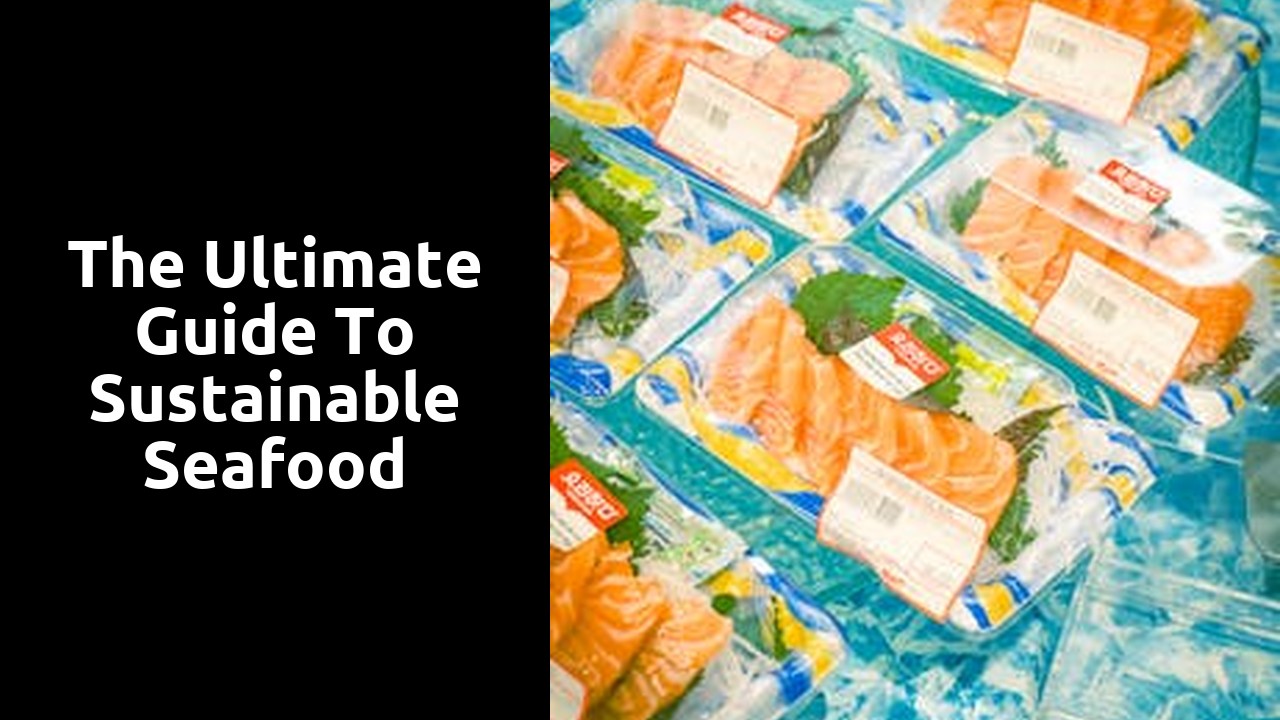The Ultimate Guide to Sustainable Seafood

Sustainable Seafood Shopping Tips
When shopping for sustainable seafood, look for certification labels from reputable organisations like the Marine Stewardship Council (MSC) or Aquaculture Stewardship Council (ASC). These labels indicate that the fish has been sourced using environmental-friendly practices, ensuring the health of ocean ecosystems. Additionally, opting for locally caught seafood reduces carbon emissions from transportation and supports local fishermen.
It is essential to inquire about the origin of the seafood you are purchasing, as well as the fishing methods used. By choosing seafood caught with sustainable methods such as pole and line, troll, or trap fishing, you can contribute to the preservation of marine life and ecosystems. Moreover, be mindful of overfished species and explore alternative options to reduce the demand for endangered fish populations.
Local and Seasonal Options
Choosing local and seasonal seafood options is a fantastic way to support sustainability while enjoying fresh flavours. When selecting seafood that is local to your region, you are not only reducing the carbon footprint associated with transportation but also supporting local fishing communities. By consuming seasonal seafood, you are also ensuring that you are enjoying the fish and shellfish at their peak freshness and flavour.
One of the best ways to discover what seafood is in season in your area is by visiting local fish markets, talking to fishermen, or engaging with community-supported fisheries. By buying directly from these sources, you can have a better understanding of where your seafood comes from and how it is caught. Additionally, choosing to purchase local and seasonal seafood options often means you are also making a healthier choice, as these options are typically fresher and more nutrient-rich than imported varieties.
Supporting Sustainable Seafood Initiatives
Supporting sustainable seafood initiatives is crucial in ensuring the long-term health of our oceans and marine life. By choosing to purchase seafood that has been sustainably sourced, consumers can play a significant role in encouraging responsible fishing practices. This can help to preserve fish populations, protect marine ecosystems, and promote the well-being of coastal communities that rely on fishing for their livelihoods.
Various organisations and certification programs have been established to promote sustainable seafood practices. By supporting these initiatives, consumers can make informed choices about the products they buy and help drive positive change within the seafood industry. It is important for consumers to educate themselves about sustainable seafood options and support businesses that prioritise ethical and environmentally friendly fishing practices.
Ways to Promote Sustainable Fishing
To promote sustainable fishing practices, it is crucial to raise awareness among consumers about the importance of choosing seafood that has been sourced responsibly. Education plays a key role in this process, as consumers need to understand how their choices impact the health of our oceans and the survival of marine species. By sharing information about sustainable fishing methods and the benefits of choosing certified seafood, individuals can make more informed decisions when purchasing fish and other seafood products.
Furthermore, supporting organisations and initiatives that advocate for sustainable fishing is another effective way to promote responsible practices in the seafood industry. By donating to or volunteering with marine conservation groups, individuals can contribute to the protection of marine ecosystems and the well-being of fish populations. Additionally, participating in campaigns that promote sustainable seafood and encourage fishing practices that minimise environmental impact can help drive positive change within the industry. By working together to support sustainable fishing initiatives, we can help safeguard the future of our oceans and ensure a steady supply of seafood for generations to come.
Health Benefits of Sustainable Seafood
When it comes to sustainable seafood, the benefits are not only environmental but also extend to our health. Opting for sustainably sourced seafood means choosing products that are free from harmful chemicals and contaminants. This ensures that you are consuming food that is not only good for the planet, but also for your body.
Additionally, sustainable seafood is often fresher and more nutrient-rich compared to conventionally sourced seafood. It is packed with essential vitamins and minerals like omega-3 fatty acids, which are known to support heart health and brain function. By incorporating sustainable seafood into your diet, you not only support sustainable fishing practices but also nourish your body with quality, wholesome food.
Nutritional Advantages
Sustainable seafood not only helps to protect the environment and marine life, but it also offers numerous nutritional advantages for consumers. One of the key benefits of opting for sustainably sourced seafood is the higher nutritional value it provides compared to conventionally harvested options. Fish like salmon, mackerel, and sardines are rich in omega-3 fatty acids which are crucial for heart health and brain function. By choosing sustainable seafood, you can ensure you are getting these essential nutrients while also supporting responsible fishing practices.
Moreover, sustainable seafood tends to be fresher and of higher quality since it is often sourced locally and with more care. This means that you are more likely to enjoy seafood that is packed with vitamins and minerals that are beneficial for overall health and well-being. Whether you are looking to increase your protein intake, boost your omega-3 levels, or simply enjoy a delicious and nutritious meal, choosing sustainable seafood can be a great way to enhance your diet and support sustainable fishing practices.
Related Links
Review: The Best Sustainable Salmon BrandsHow to Choose Between Wild and Farmed Salmon
5 Sustainable Seafood Labeling Certifications to Know
The History of Sustainable Salmon Fishing